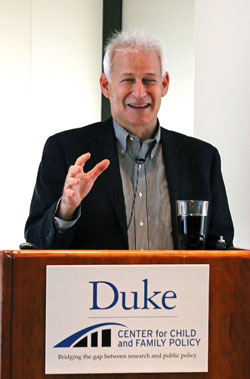
The early childhood years provide a critical window for helping vulnerable children, but most programs don't take advantage of recent advances in brain science, Jack P. Shonkoff said Tuesday in a talk sponsored by Duke's Center for Child and Family Policy.
"Right before our eyes is an exploding revolution in biology," said Shonkoff, who directs the Center on the Developing Child at Harvard University. "We should use that science to set a higher bar."
Shonkoff, a pediatrician by training, described some of the ways early experiences can shape brain development, noting that early trauma can interrupt formation of healthy brain circuits.
"Individuals may not remember early adverse events," Shonkoff said. "But the body doesn't forget."
Shonkoff also noted the important role North Carolina has played in early childhood policy and practice in the past, through groundbreaking studies such as UNC-Chapel Hill's Abecedarian Project, and through the creation of the Smart Start early childhood program.
"North Carolina has historical significance in this country," Shonkoff said. "I feel like I'm standing on hallowed ground."
Shonkoff's talk took place in Rhodes Conference Room at the Sanford School of Public Policy as part of the Sulzberger Distinguished Lecture series.